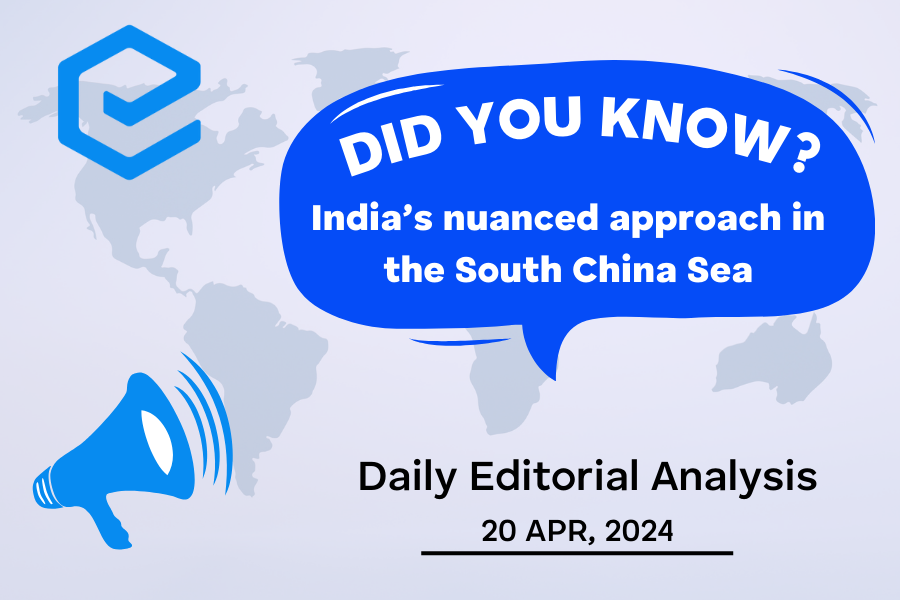
India’s approach to the South China Sea issue reflects a delicate balancing act, driven by strategic considerations and regional dynamics. While India maintains a keen interest in freedom of navigation and peaceful resolution of disputes in the region, it avoids direct confrontation with China. Instead, New Delhi emphasizes multilateralism and adherence to international law, bolstering partnerships with Southeast Asian nations and participating in joint naval exercises. This nuanced stance allows India to assert its interests while minimizing escalation in the volatile maritime domain.
Tag: GS-2 IR
In News: New Delhi’s approach to the South China Sea (SCS) is undergoing a shift. This strategic adjustment acknowledges the critical significance of the South China Sea to regional security and the global maritime order.
Contents
- 1 India’s Evolving Approach to the South China Sea Disputes
- 2 Conclusion:
- 3 FAQs
- 3.1 1. Why does India involve itself in the South China Sea issue?
- 3.2 2. How does India balance its relations with China while addressing the South China Sea dispute?
- 3.3 3. What role does international law play in India’s stance on the South China Sea?
- 3.4 4. How does India’s involvement in the South China Sea affect its regional partnerships?
- 3.5 5. What are the potential risks for India in navigating the South China Sea dispute?
- 4 In case you still have your doubts, contact us on 9811333901.
India’s Evolving Approach to the South China Sea Disputes
Historical Context:
- During a visit to the Philippines in March 2024, the Indian External Affairs Minister affirmed India’s full support for the nation’s sovereignty amidst escalating tensions between Manila and Beijing in 2023.
- A joint statement between New Delhi and Manila in 2023 underscored the importance of China adhering to maritime regulations and recognizing the 2016 ruling by the International Court of Justice (ICJ) in favor of Manila.
India’s Shifting Approach:
- India’s stance on the South China Sea (SCS) has evolved from a cautious and neutral stance to a more proactive and strategic approach, reflecting its broader strategic and economic goals on the global stage.
- Initially driven by economic motives under the Look East Policy, India’s engagement in the region transitioned to the Act East Policy, emphasizing strategic partnerships, enhanced security cooperation, and economic integration with Indo-Pacific nations.
India’s Relationship with China:
- China’s assertiveness in the SCS and Indian Ocean has prompted India to adopt a more proactive stance in response to perceived threats to its maritime security.
- The complex relationship between India and China, marked by border disputes and periodic incursions, further influences India’s position on the SCS.
- India’s Strategic Engagements:
- India has bolstered its capabilities through measures such as forward positioning, mission-based deployments, heightened maritime domain awareness, and the development of deep-water maritime facilities.
Strategic Engagements with ASEAN:
- India’s strategic adjustment acknowledges the significance of the SCS for regional security and the global maritime order, emphasizing ASEAN centrality and advocating for a rule-based international maritime order.
Challenges and Options:
- India faces challenges in navigating the complexities of the SCS disputes while exploring various options, including capacity-building initiatives, defence cooperation, infrastructure development, and advocacy for upholding international law.
Conclusion:
- India’s nuanced approach to the SCS disputes reflects its broader strategy to protect its interests while contributing to collective efforts aimed at preserving peace, stability, and adherence to international law in the Indo-Pacific region.
Source: TH
FAQs
1. Why does India involve itself in the South China Sea issue?
India’s involvement stems from its strategic interests in maintaining freedom of navigation and upholding international law in the region, which is crucial for its trade and energy security.
2. How does India balance its relations with China while addressing the South China Sea dispute?
India adopts a nuanced approach by emphasizing multilateralism, engaging with Southeast Asian nations, and participating in joint naval exercises. This allows it to assert its interests without directly confronting China.
3. What role does international law play in India’s stance on the South China Sea?
India consistently advocates for adherence to international law, including the United Nations Convention on the Law of the Sea (UNCLOS), to ensure disputes in the South China Sea are resolved peacefully and in accordance with established norms.
4. How does India’s involvement in the South China Sea affect its regional partnerships?
India’s active engagement in the South China Sea issue strengthens its partnerships with Southeast Asian nations, as it demonstrates India’s commitment to regional stability and security through collaborative efforts.
While India seeks to assert its interests in the region, it must carefully manage the risk of antagonizing China, a major economic and strategic partner. Any escalation of tensions could have repercussions for India’s broader geopolitical and economic objectives.
In case you still have your doubts, contact us on 9811333901.
For UPSC Prelims Resources, Click here
For Daily Updates and Study Material:
Join our Telegram Channel – Edukemy for IAS
- 1. Learn through Videos – here
- 2. Be Exam Ready by Practicing Daily MCQs – here
- 3. Daily Newsletter – Get all your Current Affairs Covered – here
- 4. Mains Answer Writing Practice – here

